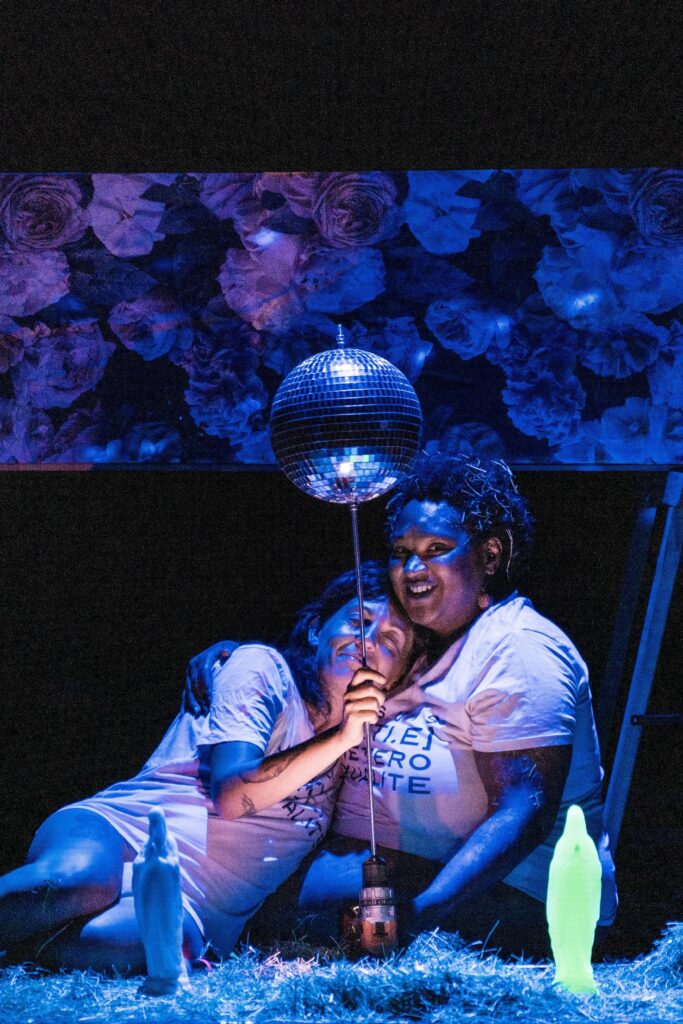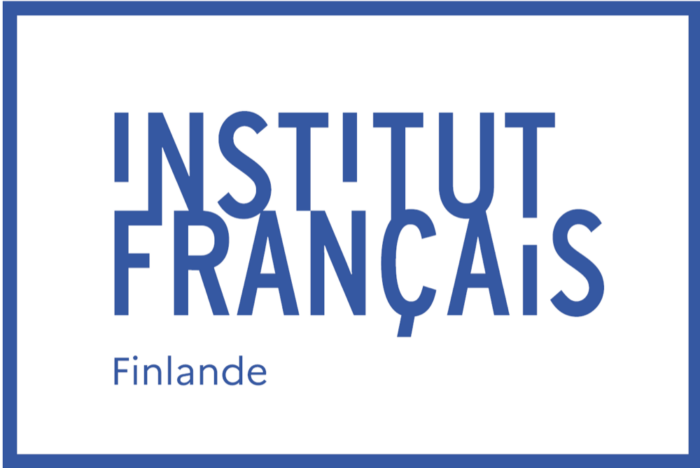
Rébecca and Sandra, you are a couple both in life and on stage in La Gouineraie. What is it like to work and create together? Do you draw a line between everyday reality, private life, and your shared presence on stage within a potentially fictional space? And what sparked your desire to collaborate artistically?
Rébecca: La Gouineraie started with a commission from the (Re)Mix festival at La POP, a Paris venue dedicated to contemporary sound art and music. The festival suggested that I invite someone to work with me. It was an opportunity to try collaborating with Sandra; as we are both writers, actors and directors, we had the feeling, that we could also have fun together onstage.
I tended to joke about the parallel between making babies and making shows. Early on, I said to Sandra, “You have kids. I have shows.” and Sandra had to explain that it wasn’t the same thing, nor the same responsibility—which I finally understood after spending time with her: you can leave a show, but it’s harder to leave a child. But in any case, this show is really focused on the idea of a project for the two of us, which is also a place where we can come together.
Sandra: I don’t really draw a line between the everyday life and the stage in this show, in the sense that one feeds the other and vice versa. Let’s just say that on stage we offer a spectacular version of our couple, but underneath the layer of performer, actress, clown and director, there’s always Sandra and Rebecca, our knowing glances, our experiences of the days spent together before the performance, our shared lives. Doing this play with Rébecca means continuing to nurture a love story with a vocabulary other than that of classic romances. We don’t share a house or children together, but we continue to build this story and a show.
Rébecca: For my part, there’s something a little selfish, which consists in telling myself that since I’m always at work, I might as well look at the way private life continues working onstage. Sometimes it makes me laugh when venues want to offer us dates in 2028, I’m like “Watch out, the show’s longevity is contingent on us managing to remain a couple!” It’s one of my most intimate shows.
Sandra: What motivates me is telling a story about attempts. Rébecca and I have very few answers, whether individually, in our two-person collective or in our couple. Nevertheless, for the last seven years, in our careers, in our lives and together as a couple, we’ve created spaces for attempts. We try out a lot of things in order to live, to be together, to work, to love each other, to create families, or to rekindle our ties with the families we already have. In the show, we open our attempts, the same way we could open our suitcase, it’s like dissecting our attempts together, with the audience. That’s what allows the show to always be in motion, because we always have new attempts in our lives, new events, new accidents, which mean that at every new session we have new questions to suggest.
Could you share with us how the title of the performance came about?
Sandra: Rébecca is the one who found the title. She wanted to justify her theater studies with a tribute to Chekhov!
Rébecca: It started off as a joke, we were talking about the country dyke and the city dyke, and The Cherry Orchard became The Dyke Orchard.
Sandra: The Cherry Orchard is the end of a bourgeois world, people who must leave this cherry orchard behind. It’s over for them, and we’re the ones who come in to replace them. With our clumsiness, our plastic tractors, our doubts, our prefab houses, our wrong codes…
Rébecca: The fact that it leans towards questions of rurality, parenthood, and life together made me ask myself whether it was legitimate for me to deal with these issues, given that I don’t have kids or live in the countryside. But the conclusion I came to is that I’ve built a theater family, that my inner circle is the people I work with. And Sandra also allows me to reinvest in and question my existing family, my forebears and my brothers and sisters, to analyze the role that family and television played in my makeup. I certainly don’t want to give the impression that the only way to make a family or to cope, as a black person, is to ally yourself to the project of a white person who may have a less traumatic family-life experience. In fact, I’m saying I don’t know how to project myself, how to construct myself, but that it isn’t a completely negative thing.
Rébecca, I am curious–after presenting your performance Whitewashing last year at the festival, how do you situate La Gouineraie in relation to your other works?
Rébecca: It’s definitely a new challenge. As I said earlier La Gouineraie might be the most intimate work that I have participated in.
Whitewashing was such a heavy responsibility, such a strong piece that has resonated with so many people. It has changed a bit the constitution of the audience. More black and queer people came into the venues. I felt empowered–embracing the subject of racism and sexism. During 7 years of my life, I was writing and performing Whitewashing around Europe.
At first, I thought nothing could be stronger. But when performing La Gouineraie with Sandra, I realized how valuable it was to explore this intimacy–allowing ourselves to appear more vulnerable and “in process”–both for us and the audience. I love how talking about love, family heritage and our future stays an empowerment. It’s also been seven years of work, much of it in the shadows, that we’re finally able to share. I have heard that many of our heterosexual friends have been inspired by Sandra’s ideas of love and family. That reassures me of the power that our work has within the performing arts.
Rébecca Chaillon & Sandra Calderan: La Gouineraie
Kiasma Theatre 12.11.2025 18.00 / 13.11.2025 18.00
Soup Talk 13.11.2025 12.00 @Caisa
Text, Direction: Sandra Calderan & Rébecca Chaillon
With: Sandra Calderan & Rébecca Chaillon
Stage management: Suzanne Péchenart
Dramaturgy, collaboration in staging: Céline Champinot
Scenographic collaboration: Camille Riquier
Production, Development: Mélanie Charreton / O.u.r.s.a M.I.n.o.r, Malaury Goutoule Administration and touring Élise Bernard & Amandine Loriol
Production: Compagnie Dans le ventre, Compagnie des Hauts Parleurs
Coproduction: CDN de Besançon Franche-Comté
With the support of: T2G – Théâtre de Gennevilliers – CDN, Villa Valmont – Lormont Nouvelle Aquitaine
The first version of La Gouineraie was presented in La Pop, in the frame of (Re)Mix festival.
The Compagnie Dans le ventre is supported by the French Ministry of Culture (DRAC Hauts-de-France).
Photo: Pietro Bertora
Visit in collaboration: Kiasma Theatre
Visit supported by: Institute Français Finlande

